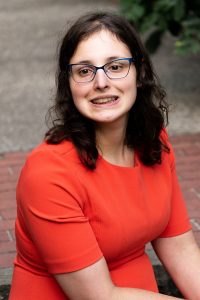Chloe Rothschild is an autistic adult who graciously shared her experience of receiving ABA services as an adult.
Chloe, can you please tell us a little bit about yourself?
I am 29 years old. I like to advocate for autism. I serve on the Arc of United States Board of Directors and on the OCALI Advisory Board. I’m a teacher’s aide at a school for kids with autism. I like dogs and cats and arts and crafts.
How did you learn about ABA?
I must have seen something. When I aged out of school at 22 I reached out to one of my beloved teachers. I asked my prior teacher who the district used for ABA services. That person’s name was shared with me and I contacted them. She hadn’t really worked with adults that frequently or often before. She owns a clinic and had worked with children but for some reason she agreed to work with me.
Why did you want ABA services?
I wanted someone who knew what they were doing. So much of the adult service world isn’t great. I didn’t want to have staff who didn’t know what they were doing. I figured that someone in the field of ABA was more likely to know what they were doing. I was particularly careful after a bad experience I had. I went to a summer camp in 2011 and it was so awful. I had a horrific experience. I have PTSD because of how I was treated at that summer camp. I learned to be very selective. My parents have also been a huge part of helping me.
How has ABA helped you?
When I first began, I had a very high level of inflexibility. Now when things come up, I’m usually okay with it. I’m much more flexible. My ABA team and I have worked on interrupting and other social skills. I’ve learned about body awareness in the community. I’ve also broadened my leisure skills and interests. We are currently working on a perseveration plan.
The helpful thing is that I’m a huge part of deciding about what I want to work on. It is never, “This is what you are doing,” from the therapy team. I do need to get pushed out of my comfort zone. Sometimes it is me agreeing to try things, maybe for three times, and then I can decide about whether I like it or not. To be honest a huge part of what the BCBA wants is for me to learn to better advocate for myself. My BCBA is not trying to fix me, she is just trying to help me work on things that I want to work on in order to make it so that I can reach my fullest potential and be successful.
I currently work with a BCBA and two RBTs. If something isn’t right, I go right to the BCBA and make sure it is addressed. This is very much a team approach. I feel listened to; I feel like I am heard. I think a team approach is important for people of any age. Caregivers, parents, and staff should all be involved in decision making.
What do you think it is important for behavior analysts to know about working with autistic adults?
That they likely don’t want to change who they are, they just want to be successful in their life. There is a way to do that without taking things away from them. They just want to learn. It is very important that you listen to and respect the autistic individual and their wishes. My BCBA learns from me, and I learn from her. This all starts with trust.
“If you are not on a team with the person, it’s not going to work out!”
